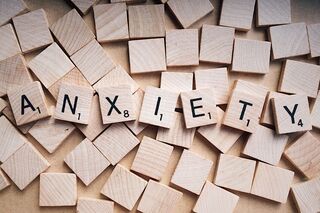Anxiety
Coping with Anxiety
The straight facts about anxiety and how to treat it.
Posted June 3, 2021 Reviewed by Gary Drevitch
Key points
- Anxiety disorders are common conditions affecting nearly 20% of U.S. adults annually.
- Many people feel anxious occasionally, but clinical anxiety negatively affects one’s ability to function in important areas of life.
- Anxiety disorders are treatable conditions that deserve medical attention.

“Having anxiety is like walking around with an umbrella waiting for it to rain." —Unknown
A recent report by the CDC detailed significantly increased rates of clinical anxiety in adults surveyed since the onset of the COVID-19 pandemic. While some have experienced clinical anxiety related to the more typical stresses of everyday life such as job, school, or relationship issues, many more others have experienced anxiety due to the rapid changes, uncertainty, and riskiness that accompanied the recent pandemic. But what exactly do we mean by clinical anxiety? In our respective practices, we commonly evaluate and treat clinical anxiety disorders. Interestingly, however, we find that despite the high prevalence of these conditions, there is often a lack of awareness and understanding about them.
How do we define anxiety and how do we know if it is of clinical significance?
Anxiety is defined as an apprehensive uneasiness or nervousness, often over an anticipated situation. When anxious, people experience excessive worry and edginess. They may even have physical symptoms such as shortness of breath, sweating, or heart palpitations. Evolutionarily, anxiety is helpful in small doses. For example, if you happen to find yourself with a flat tire in an unfamiliar neighborhood at night, you’d likely experience feelings of anxiety. This anxious state will heighten your alertness response and be helpful with navigating your way out of this situation.
Clinical anxiety is problematic. It negatively affects a person’s ability to adequately function in important areas of life (e.g. relationships, work, school, activities) and is experienced frequently and intensely or out of proportion to the situation.
Most of us have times in our lives when we feel stressed out whether due to working late on a homework assignment or having a heated discussion with a family member or friend. People who are stressed out may describe feeling anxious, tired, or irritable. Overlap exists with feelings of anxiety and being stressed out. Clinical anxiety, however, is experienced more often, more consistently, and more severely than the stressed-out feeling that can occasionally occur.
What are anxiety disorders?
Anxiety disorders are the most common mental health condition in the U.S. According to the National Institute of Mental Health (NIMH), anxiety disorders affect 19.1% of the U.S. adult population annually. People of all ages can be affected. Clinical anxiety disorders may include any of the following diagnosable and treatable conditions—panic disorder, generalized anxiety disorder, obsessive-compulsive disorder, social anxiety disorder, and specific phobias.
What causes anxiety disorders?
Anxiety disorders often have a significant hereditary component – meaning they tend to run in families. Additionally, environmental factors (e.g., chronic stress, public speaking, socializing in crowds, change in job or career) can precipitate or worsen symptoms of anxiety. Anxiety disorders are often a chronic condition, lasting six months or longer. However, depending upon the cause, there are certain situations in which an anxiety disorder can be cured (e.g. due to a medical problem) or self-limiting (e.g. related to a specific event).
Is there treatment for clinical anxiety?
Highly effective treatments exist for clinical anxiety disorders. As with other illnesses and clinical conditions, a healthy lifestyle (adequate rest, healthy nutrition, regular exercise, self-care) goes a long way toward helping you to feel better overall, including emotionally. If necessary, clinical treatment interventions include various types of therapy, biofeedback, diaphragmatic breathing, and/or medications. A trained healthcare professional can help with evaluation and proper treatment. The important thing is to seek help if you are suffering from a clinical anxiety disorder.


